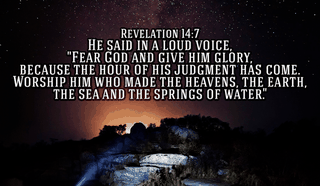
- Recent Translations
- All Translations
Apocalipsis 14:20
Share
Settings
de largo y de una altura que llegaba a los frenos de un caballo.
Images for Apocalipsis 14:20

Apocalipsis 14:20 Meaning and Commentary
And the winepress was trodden without the city
The beloved city, the new Jerusalem, into which none of the wicked will enter, and without which are dogs ( Revelation 20:9 ) ( 21:27 ) ( 22:15 ) . The allusion may be, as Dr. Lightfoot thinks, to the olive presses, which were without the city of Jerusalem, from whence Gethsemane had its name, whither our Lord went, and where his sorrows began the night he was betrayed: hell is sometimes expressed by outer darkness, and said to be far off from heaven, and between the one and the other a great gulf is fixed, the distance is considerable; hence men are said to go forth to behold the miseries of the wicked; see ( Matthew 22:13 ) ( Luke 16:23 Luke 16:26 ) ( Isaiah 66:24 ) .
and blood came out of the winepress;
alluding to the juice squeezed out of grapes, called the blood of grapes, ( Genesis 49:11 ) .
Even unto the horses' bridles, for the space of a thousand and six
hundred furlongs;
which is only an hyperbolical expression, setting forth the largeness and universality of the destruction of the wicked, and the impossibility of their escaping it. In like manner the Jews express a great slaughter of men; so of the slaughter at Bither, by Adrian, they say F5, they went on slaying (wmjwx-de Mdb) (owoh eqvv de) , "until a horse plunged in blood up to his nostrils", and the blood ran four miles into the sea; which is not to be understood literally, but as expressing a prodigious effusion of blood: and as to
the space of a thousand and six hundred furlongs,
perhaps there may be an allusion to the measure of the land of Israel, and the common notion of it among the Jews, who make it to be the square of four hundred parsoe F6: hence they often speak of the land of Israel shaking and moving four hundred "parsoe", upon some extraordinary occasions F7; and a "parsa" contained four miles F8, so that four hundred "parsoe" made a thousand and six hundred miles; and if miles and furlongs are the same, in which sense only the land of Israel could be so large, here is the exact space; for Jerom F9, who was an inhabitant of it, says, it was scarce 160 miles in length, to which agrees R. Menachem F11; and it may be observed, that the Arabic version renders the words, "by the space of a thousand and six hundred miles". The Ethiopic version, very wrongly, reads, "sixteen furlongs".
F5 T. Hieros. Taanioth, fol. 69. 1.
F6 T. Bab. Bava Metzia, fol. 28. 1. Gloss. in ib.
F7 T. Bab. Megilla, fol. 3. 1. & Bava Kama, fol. 82. 2. & Menachot, fol. 64. 2.
F8 T. Bab. Pesachim, fol. 92. 2. Gloss. in ib.
F9 Ad Dardanum, fol. 22. 1. Tom. 3.
F11 In Gen. fol. 60.
Apocalipsis 14:20 In-Context
de largo y de una altura que llegaba a los frenos de un caballo.